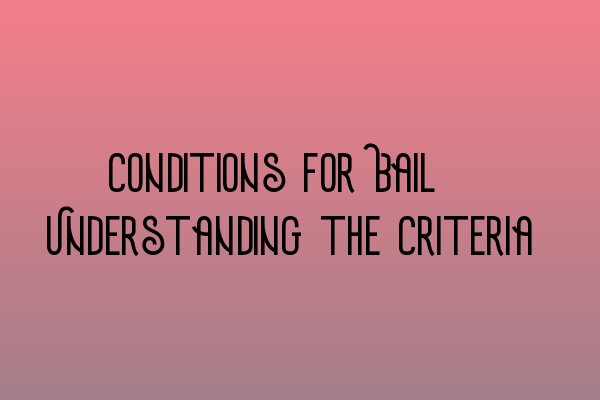Conditions for Bail: Understanding the Criteria
When facing criminal charges, one of the key concerns for individuals is whether they will be granted bail or not. Bail provides individuals with temporary release from custody, allowing them to continue their lives while awaiting trial. However, the court must carefully consider certain criteria before deciding whether to grant bail or not. In this article, we will delve into the conditions for bail and help you understand the criteria involved.
The Importance of Bail Conditions
Bail conditions are put in place to ensure the safety of the public and to prevent further criminal activity. These conditions can vary depending on the severity of the alleged crime, the likelihood of the accused fleeing, and the likelihood of the accused interfering with witnesses or evidence.
Criteria for Granting Bail
When considering whether to grant bail, the court takes into account several factors. These factors include:
- Flight Risk: The court will consider whether the accused is likely to flee if granted bail. Factors such as ties to the community, employment, and family responsibilities will be assessed.
- Severity of the Offense: The court will assess the seriousness of the alleged crime. More serious offenses may increase the likelihood of the accused being denied bail.
- Prior Criminal Record: An individual with a history of criminal behavior may be seen as a higher risk and could be denied bail.
- Community Safety: The court will evaluate whether releasing the accused poses a risk to the safety of the community. If there is a substantial risk, bail may be denied.
- Interference with Witnesses or Evidence: If there is a concern that the accused may attempt to intimidate witnesses or tamper with evidence, the court may choose to deny bail.
Bail Conditions: What to Expect
If granted bail, it is likely that the court will impose certain conditions to ensure compliance and safety. Common bail conditions include:
- Reporting to a Police Station: The accused may be required to regularly report to a designated police station to provide updates on their whereabouts.
- Restrictions on Travel: Travel restrictions may be imposed to prevent the accused from leaving the jurisdiction without permission.
- Curfew: A curfew may be set, requiring the accused to stay at a specified location during certain hours.
- Prohibition on Contact: The accused may be prohibited from contacting certain individuals, particularly victims or witnesses.
- Surrender of Passport: In cases where flight risk is a concern, the court may require the accused to surrender their passport.
- Security or Bail Bond: The court may require the accused or their family to provide a financial guarantee, such as a bail bond, to ensure their compliance with bail conditions.
Conclusion
Understanding the conditions for bail and the criteria involved is crucial when facing criminal charges. By considering factors such as flight risk, severity of the offense, prior criminal record, community safety, and potential interference with witnesses or evidence, the court can make an informed decision regarding bail. If granted bail, it is important to comply with the imposed conditions to ensure a smooth legal process.
If you found this article helpful, you may also be interested in these related articles:
- SQE Exam Prep: Essential Study Materials for Aspiring Solicitors
- Demystifying the Solicitors Qualifying Examination Format
- SQE Exam for International Lawyers: Challenges and Success Strategies
- LLC Formation Made Simple: Step-by-Step Guide for UK Entrepreneurs
- LLC Formation: A Step-by-Step Guide for UK Entrepreneurs
